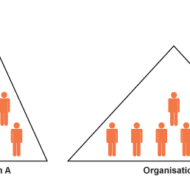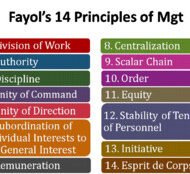Posted by Managementguru in Business Management, Organisational behaviour, Principles of Management
on Mar 3rd, 2014 | 0 comments

Levels of Organization An organization is a network consisting of people interacting to accomplish the enterprise objectives. The inter relationship is always complex as groups tend to develop conflicts and difference of opinion among themselves and in between. Hence the structure of an organization should be designed to clarify who is to do what task and who is responsible for what results and to furnish decision-making devoid of uncertainty. Organization implies to Recognizing and classifying the required activities Grouping of activities in order to achieve the objectives Appointing a manager and assigning him with the necessary authority to lead each group The provision for co-ordination vertically and horizontally “Organization is the establishment of authority and relationships with provision for coordination between them, both vertically and horizontally in the enterprise structure,” According to Koontz. FORMAL ORGANISATION It implies a formalized intentional structure of roles or positions. Formal organization must be flexible. The formal structure is laid down by the top management The levels are designed on the basis of specialization Purely task oriented and not people oriented Rules are very stringent and everyone is expected to follow them without fail INFORMAL ORGANISATION A network of personal and social relations arising spontaneously as people associate with one another and not restricted by the formal rules or structure. One important aspect of organizing is the establishment of department. Department designates a distinct area, division, or branch of an organization over which a manager has authority for the performance of specified activities. Spontaneous in nature More people oriented Based on religion, culture, common problems faced by the workforce etc., Membership is voluntary and the same person can be a member of many groups. ORGANISATION LEVELS AND SPAN OF MANAGEMENT Why there is a need to organize? To co-ordinate the activities of the people involved in the organization’s functions for which there needs to be certain levels established to facilitate the co-operation effective. There are two types of spans, 1. Wide span 2. Narrow span Pic Courtesy: LumenLearning WIDE SPAN: Wide span of management has fewer organizational levels with more number of sub-ordinates reporting to a superior. Though it proves advantageous for the superior as delegation becomes part of the process and hence work is shared, care must be taken in selecting the right people for completion of tasks and clear policies must be made to avoid confusion. There is this tendency of overloaded superiors to become decision bottlenecks and there exists the danger of superior’s loss of control too. This kind of management needs exceptionally qualified managers to lead the respective groups. NARROW SPAN: Narrow span of management involves many organizational levels with fewer number of employees reporting to a superior. This facilitates close supervision, close control and fast communication between superiors and subordinates. On the contrary, superiors tend to get too involved in subordinates’ work and this kind of management incurs higher costs due to many levels in the organization and there is excessive distance between the lowest and top most levels. FACTORS DETERMINING AN EFFECTIVE SPAN: 1. Training of Subordinates: Well trained subordinates save much time and energy of the superiors and training has to be a continuous process as the technological policies and procedures are subjected to change periodically. 2. Clarity of Delegation of Authority: Clarity implies direction and guidance from the manager’s end to the subordinate. A manager has the responsibility of clearly explaining the task and the methods involved to complete the task in a suitable manner to his subordinates. In cases of machine handling, “On the Job Training” becomes inevitable. If not, the work will not be completed as per the schedule due to lack of clarity. 3. Clarity of Plans: In a production environment, the workers have to be...

Posted by Managementguru in Business Management, Principles of Management
on Feb 25th, 2014 | 0 comments

Evolution of Management Theory -II MANAGEMENT PROCESS SCHOOL Henri Fayol (1841-1925) Henri Fayol has propagated 14 principles on management which are very popular. 1. Division of labor: He insists on a high degree of specialization in order to improve efficiency. Both managerial and technical works are amenable to specialization which leads to better work with the same efforts. 2. Authority and Responsibility: Authority can be classified into Official and Personal authority, the former needed by a manager to extract work from the subordinates and the latter emanating from the manager’s own intelligence, integrity, experience, personality, knowledge and skills. Responsibility comes along with authority; one who has the authority should also be able to take up responsibility. 3. Discipline: Obedience, diligence, correct attitude and outward mark of respect is the essence of discipline which exists as an unwritten agreement between the management and its employees 4. Unity of Command: A subordinate must receive orders and instructions from one superior only. 5. Unity of Direction: Activities of similar nature should be grouped under one superior so that the efforts could be streamlined towards the common goal. 6. Sub-ordination of individual’s interest to the Common Goal: The personal interests of an individual (like money, recognition etc.) should not be placed before the goal of the organization, which is maximizing production. 7. Remuneration: Fair and equitable remuneration should be provided to employees to ensure better production and satisfaction. 8. Centralization: The concentration and dispersal of authority must be balanced in an organization 9. Scalar Chain: The authority chain from top to bottom should be followed at all times for the purpose of effective communication. 10. Order: Human and material resources should be co-ordinated so as to be in the required place at the required time. 11. Equity: Fairplay, justice and friendliness is what the employees expect of the organization. 12. Stability of Tenure of Personnel: Too much of Job turn over and rotation affect the work in progress and destruct the stability of the work units 13. Initiative: Subordinates must be encouraged to participate in the decision making process to show their initiative. 14. Espirit De Corps: “In union there is strength and so is team work.” Team spirit and a sense of unity and togetherness should be fostered and administered in an organization. Join Over 290+ Other Entrepreneurs Who Are Using This Course. Become An Outsourcing Master In 30 Minutes James D.Mooney and Allen C.Reilay The Line and the Staff Principle: According to this principle, the line authorities get things done while it recognizes the role of staff authority who are experts in providing guidance and advice. The emphasis is on, · Hierarchial structure · Clear decision · Delegation of Authority and Responsibility · Specialization of Tasks · Co-ordination of activities and · Utilization of staff experts A short course designed to help managers select the right person to join their team! Staff Recruitment THE HUMAN RELATIONS SCHOOL The human behaviorists believed in COLLABORATIVE management which is possible when managers are capable of harmonizing the efforts of individuals at all levels of the organization. This concept draws heavily from psychology and social psychology. · Motivation · Leadership · Communication · Training · Participative management · Group dynamics are assigned importance The important contributors are Elton Mayo, Roethlisberger, Mary Parker Follet, Chester I Bernard, Abraham Maslow and Douglas McGregar. THE EMPIRICAL SCHOOL Case study analogy is the best way to understand management is the idea behind this school of thought. The mistakes of managers are converted into rich experiences over a period of time and the findings are transferred to the practitioners in the management profession. The contributors are, · American Management Association · Harvard Business School · Ernest Dale. However, critics feel that this may not be suitable when it...




